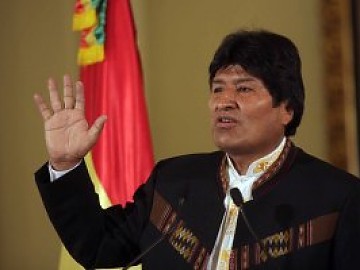
(above) Evo Morales
Bolivia Urges U.N. to Decriminalize Coca
March 14, 2009 - Latin American Herald Tribune
VIENNA -- With coca leaf in hand, Bolivian President Evo Morales made a dramatic plea in Vienna on Wednesday for the United Nations to remove the plant from its list of banned substances.
"This is a coca leaf, it's not cocaine. It's part of a culture. It's not possible for it to be on the United Nations' list of narcotics," said Morales holding the leaf in his hand, sparking applause from several delegations at the U.N. gathering in Vienna.
"This is chewing," he said, placing the coca leaf in his mouth. "It doesn't hurt anyone. Ingesting (the coca juice) does not make me a drug addict. If I were, Mr. Costa (the top U.N. counter-narcotics official, who was at the podium) would have to take me to jail," added Morales, whose actions prompted more applause.
"I'm a producer of this coca leaf. Being a producer doesn't make me a drug trafficker. This coca leaf is medicine for the people. It's not damaging to health in its natural state," he said.
"I come with great respect to ask for a historical mistake to be corrected," the Bolivian leader went on to say, criticizing the fact that coca had been included in the 1961 U.N. anti-narcotics convention.
Morales related his own experience as a user of coca leaf to illustrate to the delegations that the plant itself -- in contrast to the refined drug -- does not harm a person's health or addict anyone.
"I consumed coca leaf intensively for 10 years when I worked in agriculture and I don't feel malnourished, and I'm 50 years old," he said.
The president also said that chewing coca leaf goes back to 3000 B.C., adding that it was not possible to eliminate such an ancient practice.
The U.N. prohibition on coca, he argued, "constitutes an attack on the rights of the indigenous peoples" of the Andean region, where the leaf is used in teas, folk remedies and ancient religious rites.
In its unprocessed form, coca is a mild stimulant that eases hunger pangs and alleviates altitude sickness.
Morales, a leftist Aymara Indian who rose to prominence as the leader of a coca-growers union, repeated that his government will fight "head-on against cocaine, drug trafficking and drugs."
"There will be no free cultivation of coca, but rather zero cultivation of coca, as some organizations are considering," he said.
"There is a rationalization in a responsible way, a reduction in the cultivation of coca," he said regarding the efforts to control coca farming in his country.
Bolivian law permits the cultivation of 12,000 hectares (29,629 acres) of coca bushes for traditional purposes, and a similar arrangement prevails in neighboring Peru.
Currently, Bolivia has 27,000 hectares planted with coca, making it the third-largest producer after Colombia and Peru.
Last November, the U.S. government suspended Bolivia's participation in a tariff-exemption program for Andean nations, claiming that La Paz was not cooperating sufficiently in the war on drugs.
Morales categorically rejected that assertion and cited U.N. statistics that showed his government had done better than Washington allies Colombia and Peru both in reducing coca crops and seizing cocaine.
The Bolivian president came to office in January 2006 promising to end forced eradication of coca, a program that had led to violent confrontations.
Along with seeking to promote new industrial applications for the leaf, his government has sharply increased seizures of cocaine. EFE